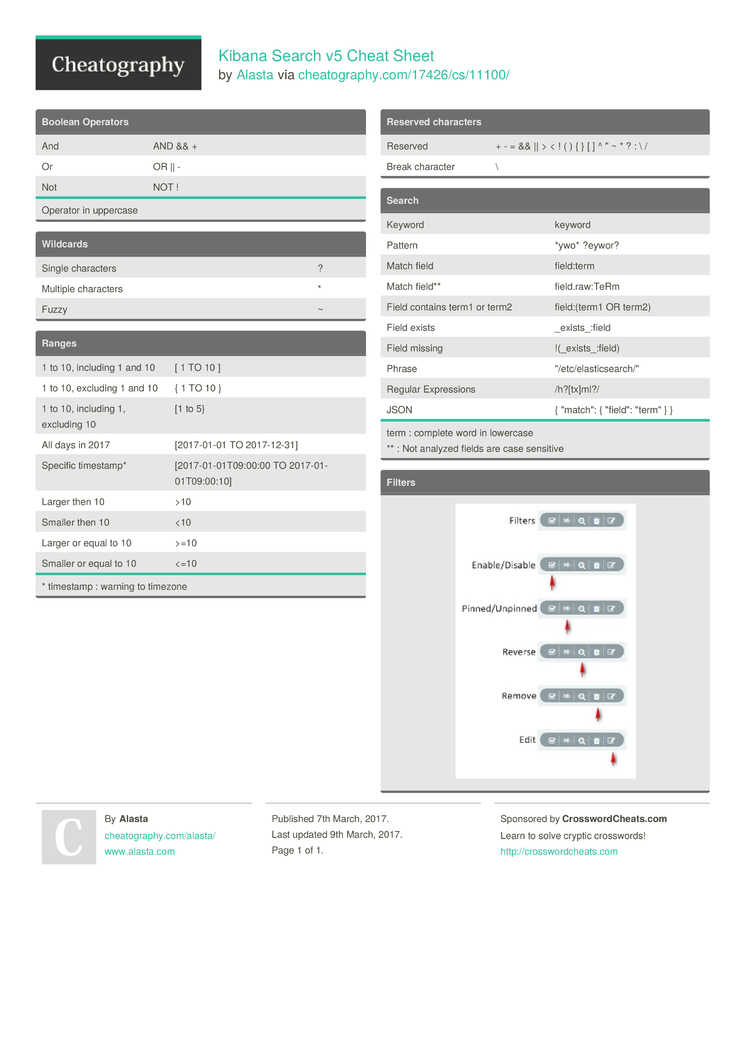Kibana query cheat sheet
Show Menu. Login or Register. This is a draft cheat sheet.
All the API endpoints and pro-tips you always forgot about in one place! Built by developers for developers. Hosted on GitHub , contributions welcome. Elasticsearch 1. Consider upgrading. More information about supported versions.
Kibana query cheat sheet
Use KQL to filter documents where a value for a field exists, matches a given value, or is within a given range. For example, to filter for documents where the http. Use KQL to filter for documents that match a specific number, text, date, or boolean value. The field parameter is optional. If not provided, all fields are searched for the given value. When querying keyword, numeric, date, or boolean fields, the value must be an exact match, including punctuation and case. For example, to search for documents where http. To search text fields where the terms are in the order provided, surround the value in quotation marks, as follows:. Certain characters must be escaped by a backslash unless surrounded by quotes. For example, to search for all documents for which http.
If you enjoyed this cheatsheet on Kibana then why not learn something new by checking out our post on Rest APIs vs Soap? X Elasticsearch 2. Consider the following document, where user is a nested field:.
Last updated: February 9th, We've created a helpful infographic as a reference to help with Kibana and Elasticsearch Lucene query syntax that can be easily shared with your team. Kibana and Elastic Search combined are a very powerful combination but remembering the syntax, especially for more complex search scenarios can be difficult. Although Kibana can provide some syntax suggestions and help, it's also useful to have a reference to hand that you can keep or share with your colleagues. Keywords, e. Phrase, e. OR keyword, e.
Last updated: February 9th, We've created a helpful infographic as a reference to help with Kibana and Elasticsearch Lucene query syntax that can be easily shared with your team. Kibana and Elastic Search combined are a very powerful combination but remembering the syntax, especially for more complex search scenarios can be difficult. Although Kibana can provide some syntax suggestions and help, it's also useful to have a reference to hand that you can keep or share with your colleagues. Keywords, e. Phrase, e. OR keyword, e. United - Returns results where either the words 'United' or 'Kingdom' are present.
Kibana query cheat sheet
This article is a cheatsheet about searching in Kibana. You can find a more detailed explanation about searching in Kibana in this blog post. Lucene is a query language directly handled by Elasticsearch. In nearly all places in Kibana, where you can provide a query you can see which one is used by the label on the right of the search box. Clicking on it allows you to disable KQL and switch to Lucene. Which one should you use? Start with KQL — which is also the default in recent Kibana versions — and just fall back to Lucene if you need specific features not available in KQL. Lucene is rather sensitive to where spaces in the query can be, e. The term must appear as it is in the document, e.
Anime prewedding
Boost Phrase, e. To specify precedence when combining multiple queries, use parentheses. Single Character wildcard. Appending a colon tells Lucene this is a Field. Wildcards be used inside a field name but need to be escaped. You can modify this with the query:allowLeadingWildcards advanced setting. To search text fields where the terms are in the order provided, surround the value in quotation marks, as follows:. KQL user. Feb 5, 1 min read. For example, to find documents where the http. Start with KQL — which is also the default in recent Kibana versions — and just fall back to Lucene if you need specific features not available in KQL. Is the name of the field that contains values. In nearly all places in Kibana, where you can provide a query you can see which one is used by the label on the right of the search box. Escape character. Preceding value matched one or more times.
Cheatsheet designed to fit a letter or A4 sheet and containing useful commands to get you started with elasticsearch or to speed you up when you are already familiar with it. This cheatsheet is designed to fit a letter or A4 sheet and contains useful commands that can get you started with elasticsearch or speed you up when you are already familiar with it. Some of the APIs were introduced in recent versions.
When querying keyword, numeric, date, or boolean fields, the value must be an exact match, including punctuation and case. When using wildcards to query multiple fields, errors might occur if the fields are of different types. Field and Term AND, e. You can also use range syntax for string values, IP addresses, and timestamps. Kibana Query Language edit. It is a work in progress and is not finished yet. Lucene is a query language directly handled by Elasticsearch. Exclusive range search, typically a number field but can search text. Most of the beginner headache with the DSL come from this:. Inclusive range search, typically a number field but can search text. For example, to find documents where the http. Hosted on GitHub , contributions welcome. To search for an inclusive range, combine multiple range queries. Change weight of fuzzy search, 0 to 1, default 0. Site plugins are no longer supported, look at Kibana applications or other standalone app like Cerebro for basic management.


You are mistaken. I suggest it to discuss.